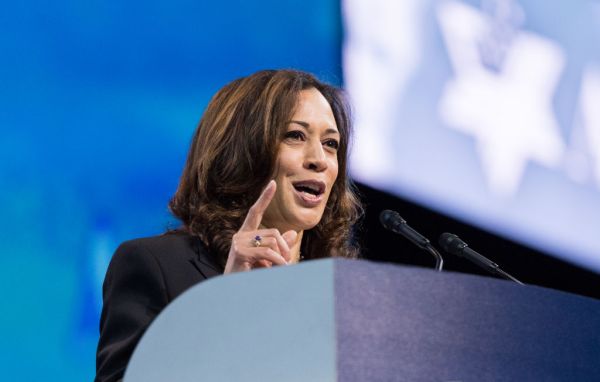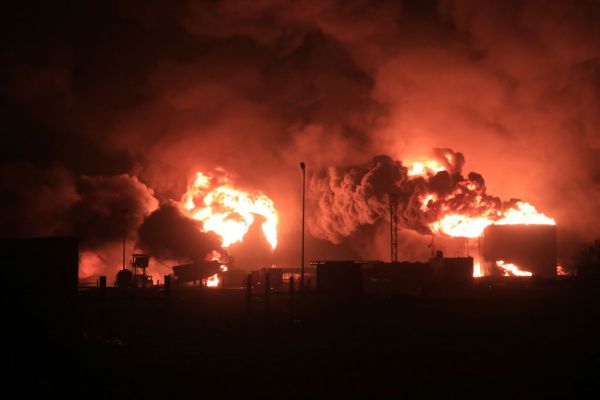TEL AVIV, Israel—President Joe Biden used his State of the Union Address last week to reiterate the U.S. commitment to eventual Palestinian statehood. “There is no other path that guarantees Israel’s security and democracy. There is no other path that guarantees Palestinians can live with peace and dignity,” he said. “There is no other path that guarantees peace between Israel and all of its Arab neighbors, including Saudi Arabia.”
But as Israel’s military campaign against Hamas drives out Gaza’s terrorist sovereigns, the American and Israeli governments have yet to agree on the first step to any such solution: how to govern the Gaza Strip and its civilian population amid a growing power vacuum. A broader consensus on who will take the reins after the conflict ends appears even further afield, even as the U.S. and its Arab allies throw their weight behind an eventual unified Palestinian state.
U.S. officials have repeatedly put forth the idea of a “revamped” Palestinian Authority (PA) as the long-term solution—an idea with backing from its Arab partners in the region. The United Arab Emirates (UAE) and other oil-rich Gulf states are now linking their financial support for Gaza’s reconstruction to a more sweeping peace deal in the hopes that a viable pathway to Palestinian statehood and a technocratic Palestinian government will prevent future outbreaks of fighting in the Strip. Parallel with that guarantee, Saudi Arabia would move ahead to normalize relations with Israel.
But the makeup of such a government remains foggy. In its current form, the PA—which governs the West Bank—is wildly unpopular among its own constituents. The governing body is riddled with corruption and, even more damning in the eyes of many in the West Bank, seen by Palestinians as in cahoots with the Israeli government. Armed groups in the Palestinian territory, including Hamas, have grown in popularity and consolidated their support in various cities and refugee camps.
Meanwhile, the PA’s president, 87-year-old Mahmoud Abbas, refuses to give up power despite behind-the-scenes U.S. efforts to reform the government in Ramallah. In a recent survey, 92 percent of West Bank respondents said Abbas should resign. Nearly 45 percent said they supported Hamas. PA Prime Minister Mohammad Shtayyeh and his government announced their resignation last month, but Abbas seems unlikely to follow suit, to the great frustration of many Palestinian factions. (Shtayyeh’s replacement has not yet been named and elections, which were last held in 2006, do not appear imminent.)
“Abbas doesn’t have control over Nablus,” Dimitri Diliani, spokesman for Fatah’s Democratic Reformist faction, referring to a city in the West Bank during an interview with The Dispatch. “Do you think he will have control over Gaza? It would be ridiculous to entertain such a thought. … Abbas has a problem with controlling and servicing areas under his direct jurisdiction.”
But opposition to the PA’s current leadership isn’t only from the Palestinian side. Israeli Prime Minister Benjamin Netanyahu has vocally opposed a PA takeover in Gaza following the defeat of Hamas, specifically criticizing the body’s “pay-for-slay” policies, which provides monthly salaries to the families of imprisoned or slain terrorists.
Netanyahu presented a one-page plan to his Cabinet outlining his own vision for the postwar Gaza last month, but it doesn’t appear to have won over the Biden administration. The document, which mainly addresses immediate-term plans, called for empowering “local officials” with prior “administrative experience” and without any ties to terrorist groups or terror-supporting countries. It’s unclear whether the PA would fall under that disqualifier or not. The prime minister also outlined the Strip’s “complete demilitarization” and open-ended Israeli security control, as well as “deradicalization” in schools, mosques, and other institutions.
Whether Israel will succeed in this ambitious restructuring of Gazan society now largely depends on the success of its military campaign. Israeli forces have made sweeping gains across the Gaza Strip, but Hamas now appears poised to either wage a bloody insurgency or absorb its former administrative roles in the areas it’s lost. Neither Israel nor the U.S. have committed to a long-term plan to prevent the group’s eventual resurgence.
In the unfolding chaos, Hamas sees an opening. The terrorist group reportedly prioritized the return of Gazans to the northern part of the Strip in recent, failed negotiations to reach a temporary ceasefire and hostage deal, indicating that it may seek to reestablish some sort of governance over the area. In a recent interview with Israeli newspaper Ynet, a Hamas security official claimed that the group’s police force had “regained control over most areas in northern Gaza” while wearing civilian clothing.
Difficulties distributing aid and maintaining law and order in recent weeks have laid bare the long road ahead for Israel. As aid groups suspend operations in northern Gaza due to the breakdown in civil order, including recent attempts by gunmen to commandeer aid trucks, Israel has sought to work with local businessmen to facilitate the distribution of food and other supplies. But when large crowds of Gazans swarmed aid convoys earlier this month, resulting in the deaths of dozens, it cast doubt on the Israeli military’s ability to guarantee the safety of local administrators and the civilians they’re serving.
The Biden administration has warned Israel that, in the absence of a clear administrative plan, the situation could devolve further. And the challenges of governing Gaza are bound to outlast the war.
“How do you make sure that Hamas doesn’t regain power and attack Israel again? What you need here is a very practical plan. You need people who are willing to be on the ground,” Nadav Eyal, a Middle East political commentator at Israeli news outlets Yediot and Ynet, said in an interview. “You need to make sure that Gaza will not fall into the hands of Hamas. These are huge challenges.”









Please note that we at The Dispatch hold ourselves, our work, and our commenters to a higher standard than other places on the internet. We welcome comments that foster genuine debate or discussion—including comments critical of us or our work—but responses that include ad hominem attacks on fellow Dispatch members or are intended to stoke fear and anger may be moderated.